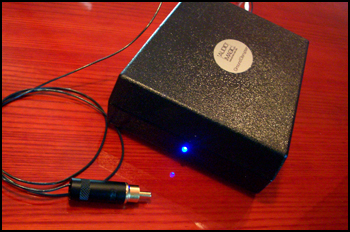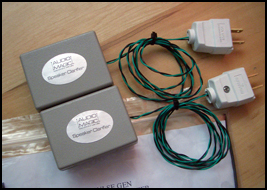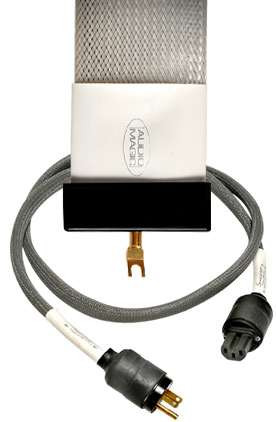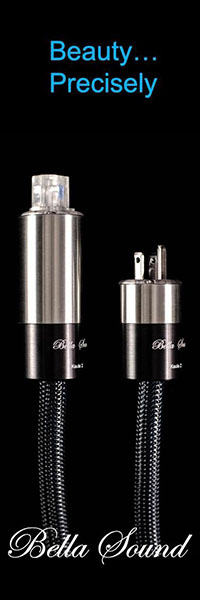THE AUDIO MAGIC LINE OF PRODUCTS
|
THE AUDIO MAGIC LINE OF PRODUCTS
|
|
Funny how some things just stay with you. Many years ago, J. Peter Moncrieff wrote in International Audio Review that a great audio system would have the same qualities as the crooning of Bing Crosby. Bing seemed to exert no effort at all when he sang – the music just seemed to flow from him. Moncrieff opined that a great system would create music like Bing: no effort, no stress, no screech. And that effortless sound would translate into an equally stress-free experience for the listener. That notion has stuck with me for all these years as one of the intractable audio truths, and my audiophile search for that quality has led me to Jerry Ramsey’s Audio Magic products. Pulse Gen ZX: $400
I see I have reviewed the Pulse Gen ZX without describing it. Briefly, it is a small plastic cube with active electronics inside that emit a proprietary group of inaudible frequencies to reduce noise in the component to which it is attached, either inside your gear at the IEC inlet, or in parallel with the power cord IEC connector. A far more detailed explanation can be found at Ramsey’s website (www.audio-magic.com). Ground Disrupter (Blue Dot): $700
Opus 3 CD’s have always been rightly praised for their consistently high quality. Listen to Eric Bibb’s SACD, Just Like Love: the delicacy and detail of the acoustic guitars, mandolin, mandola, melodica and kalimba, and Eric’s distinctive voice, come through like never before with the complete set of Pulse Gen ZX’s and Blue Dot. And that detail maintains the Bing Crosby-like ease! Speaker Clarifiers: $850/pair
Much as I like the Pulse Gen and Blue Dot, I would recommend the Speaker Clarifiers as the point at which to dip your toes into the Audio Magic line, even though the cost is a bit higher since you must buy a pair. The effect has the same flavor as the AC products, but is of greater magnitude. Mercury’s SACD release of Tchaikovsky’s First, Second and Third Symphonies (Antal Dorati conducting the London Symphony and Philharmonia Hungarica) was recorded in 1958 and 1965, yet the two SACD’s contain far more dynamic range than many more modern classical releases. The string and horn climaxes are enough to drive many a system into edginess and the sense of hearing the orchestra as one giant mass instead of individual instruments. The noise reduction provided by the Speaker Clarifiers sorts out the aural mess and makes things far easier to listen to. The Speaker Clarifiers are, to my ears, much more effective than their predecessors in my system: the Bybee Speaker Bullets (not the super effect model). Could it be that the Bybees are in the signal path? Or that they’re not active devices? I don’t know, but the Bybees remain in my drawer. Clairvoyant Liquid Air AC Power Cord: $2,000/1.5m
They say that if you lose something at the source in your system, you can’t get it back anywhere else. What the Clairvoyant Liquid Air showed me that I was missing was detail – lovely, delicate, musical detail. Pardon me for using the Ray Brown Trio’s Soular Energy (Hi Res Music, DVD-Audio) as a reference along with much of the rest of the audio world, but if you’ve heard it, you know why. Listen to any of the cuts on which drummer Gerryck King uses sticks instead of brushes, like “Mistreated But Undefeated Blues”: the unmistakable sound of nylon hitting brass instead of something that sounds like steam escaping. The detail, ease and delicacy of this sound in particular take a leap forward using the Liquid Air PC. And the accuracy of that detail makes it easier to locate the instruments (and voices) on the stage or in the studio. The Clairvoyant Liquid Air simply does detail better than any power cord I’ve heard, including the mighty JPS Aluminata ($3,995). The Clairvoyant does not have the bass and overall impact of the Aluminata, and it is a little lighter sounding overall. That makes it a great choice for source equipment, while the Aluminata is tops for amplifiers and AC conditioners. It’s important to mention that none of the Audio Magic products covered so far changes the fundamental tonal flavor of your system. They are meant to reduce noise and increase that sense of ease we’ve been talking about. But there’s always an exception, isn’t there? So…. Quantum Physics Noise Disrupter: $255 (large); $75 (small)
I didn’t expect that the Noise Disrupter would actually change the perceived frequency balance of my system more than the active devices did! But the audible evidence is there: the Noise Disrupters actually softened the high frequencies on every piece of electronics I tried it on. Thinking I was going mad, I surfed the Internet for more info on this device, and came across Robert Levi’s review in Positive Feedback Online, Issue 23. Robert mentions several components that sounded “too sweet” or “too smooth and dull” with the addition of the Noise Disrupters. Others benefitted from the devices. I too found that the Disrupters are not a universal cure. In my case, the Classé CA-301 amplifier was the best match: the added softness was not overdone in combination with this solid-state amp. Summing Up The Audio Magic products are dedicated to reducing noise in your system in a unique way: most of the products reviewed here are not duplicated in the industry, and all of them attack the noise problem – and it is a big problem – in innovative ways. The net result for me has been a greater ease in the sound of music, with a concomitant increase in my enjoyment and time spent listening. Bing Crosby would be pleased!
dave allison Digital Front End: Linn Unidisk 1.1 w/Dynamik Power Supply
Company Info: AUDIO MAGIC Phone: 1.303.369.1814 Website: www.audio-magic.com
|
| Don’t forget to bookmark us! (CTRL-SHFT-D)
|
Stereo Times Masthead
Publisher/Founder
Clement Perry
Editor
Dave Thomas
Senior Editors
Frank Alles, Mike Girardi, Russell Lichter, Terry London, Moreno Mitchell, Paul Szabady, Bill Wells, Mike Wright, and Stephen Yan,
Current Contributors
David Abramson, Tim Barrall, Dave Allison, Ron Cook, Lewis Dardick, John Hoffman, Dan Secula, Don Shaulis, Greg Simmons, Eric Teh, Greg Voth, Richard Willie, Ed Van Winkle, Rob Dockery, Richard Doron, and Daveed Turek
Site Management Clement Perry
Ad Designer: Martin Perry


 My introduction to Audio Magic began with a power cord (PC), in my collection that needed re-terminating at the IEC end. This PC, which is still in my system, was a bit of an underachiever for its $1,000+ price: smooth, but not much life. I called Ramsey and asked him if he could re-terminate the cord, and at the last minute asked him to add a Pulse Gen ZX (his signature product, used in many of his other items) at the IEC end. When the PC came back, I was very surprised at the improvements. With the addition of the Pulse Gen, the cable aurally came to life: its “boring” character was replaced by a liveliness that was unmistakable. And at the same time, the system was somehow easier to listen to. Paradoxically, that relaxed quality referenced above was there even with the addition of life to the music. Just the addition of the Pulse Gen ZX made me think that the “Bing Crosby” quality was part of the Audio Magic house sound!
My introduction to Audio Magic began with a power cord (PC), in my collection that needed re-terminating at the IEC end. This PC, which is still in my system, was a bit of an underachiever for its $1,000+ price: smooth, but not much life. I called Ramsey and asked him if he could re-terminate the cord, and at the last minute asked him to add a Pulse Gen ZX (his signature product, used in many of his other items) at the IEC end. When the PC came back, I was very surprised at the improvements. With the addition of the Pulse Gen, the cable aurally came to life: its “boring” character was replaced by a liveliness that was unmistakable. And at the same time, the system was somehow easier to listen to. Paradoxically, that relaxed quality referenced above was there even with the addition of life to the music. Just the addition of the Pulse Gen ZX made me think that the “Bing Crosby” quality was part of the Audio Magic house sound! The positive experience with the first Pulse Gen led me to order a couple more, and to experiment with some of Audio Magic’s other products. Next up in my journey was the Ground Disrupter Blue Dot, which contains a Pulse Gen ZX, a screen to dissipate noise, and some other components intended to optimize the Blue Dot for the ground leg of the AC line. It’s about twice the size of the Pulse Gen ZX, with a Blue LED (the “Blue Dot”) that indicates it’s on. It should be plugged into the same AC circuit as the audio system, or (even better) into the system’s AC conditioner. It seemed logical to me that if the Pulse Gen was this effective on the hot/neutral legs of my AC, the Blue Dot would only increase the effect by working on the ground. I was right: further musical evidence of noise reduction on the AC line.
The positive experience with the first Pulse Gen led me to order a couple more, and to experiment with some of Audio Magic’s other products. Next up in my journey was the Ground Disrupter Blue Dot, which contains a Pulse Gen ZX, a screen to dissipate noise, and some other components intended to optimize the Blue Dot for the ground leg of the AC line. It’s about twice the size of the Pulse Gen ZX, with a Blue LED (the “Blue Dot”) that indicates it’s on. It should be plugged into the same AC circuit as the audio system, or (even better) into the system’s AC conditioner. It seemed logical to me that if the Pulse Gen was this effective on the hot/neutral legs of my AC, the Blue Dot would only increase the effect by working on the ground. I was right: further musical evidence of noise reduction on the AC line. Using the same audiophile logic, I then tried the Speaker Clarifiers, devices about the same size as the Pulse Gen ZX, that contain electronics and emit frequencies optimized for loudspeakers. The Speaker Clarifiers are tied (using cable ties) around your speaker cables at the speaker end. There is no actual connection to the speaker terminals (and thus the devices are not in the signal path), but these are active devices, so they must be plugged into AC as well, using the same suggestions as above.
Using the same audiophile logic, I then tried the Speaker Clarifiers, devices about the same size as the Pulse Gen ZX, that contain electronics and emit frequencies optimized for loudspeakers. The Speaker Clarifiers are tied (using cable ties) around your speaker cables at the speaker end. There is no actual connection to the speaker terminals (and thus the devices are not in the signal path), but these are active devices, so they must be plugged into AC as well, using the same suggestions as above. How about an AC power cord? Up until a couple of years ago, most of Audio Magic cables were made using silver conductors. Then Ramsey discovered that it was possible to actually use a proprietary liquid polymer as a conductor, and liked the audible result better than silver. Since I was looking for a world-class power cord for my Linn Unidisk, I ordered up a Clairvoyant Liquid Air PC with a Pulse Gen ZX on the IEC end.
How about an AC power cord? Up until a couple of years ago, most of Audio Magic cables were made using silver conductors. Then Ramsey discovered that it was possible to actually use a proprietary liquid polymer as a conductor, and liked the audible result better than silver. Since I was looking for a world-class power cord for my Linn Unidisk, I ordered up a Clairvoyant Liquid Air PC with a Pulse Gen ZX on the IEC end. Remember VPI Magic Bricks? I still have two of them in my system. Audio Magic’s Quantum Physics Noise Disrupter is used in the same way – placed on top of electronics above the transformer to reduce EMI and RFI. The Noise Disrupter is much smaller and lighter than the VPI Brick, and has loose particles inside that make noise when you shake it. The audible effect of the Disrupters is altogether more startling than that of the Bricks.
Remember VPI Magic Bricks? I still have two of them in my system. Audio Magic’s Quantum Physics Noise Disrupter is used in the same way – placed on top of electronics above the transformer to reduce EMI and RFI. The Noise Disrupter is much smaller and lighter than the VPI Brick, and has loose particles inside that make noise when you shake it. The audible effect of the Disrupters is altogether more startling than that of the Bricks.



Be the first to comment on: THE AUDIO MAGIC LINE OF PRODUCTS